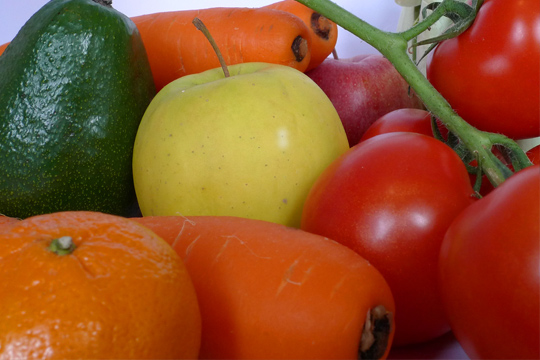
Reducing Food Waste in Foodservice
October 16, 2018 by Doreen Garelick, Dietetic Intern
Our intern Doreen attended a food waste summit for restaurants and compiled these tips to help food service operators redirect…
Nutrition 101
October 3, 2012

Culinary Nutritionist Natalia Hancock advises on how to get all the nutrients that you need.
A vegetarian diet, in its most basic form, is a plant-based diet. Various types of vegetarian diets exist: some only omit animal flesh but allow for poultry and/or seafood, while other stricter forms exclude consumption of animals and animal products altogether (e.g., eggs, dairy products, gelatin, honey, etc.).
Although a wide array of health benefits associated with eating a vegetarian diet exists, nutritional concerns may arise from the exclusion of animal products and their nutrients, which can result in several deficiencies. However, a well-planned vegetarian diet can make up for this by finding these nutrients in plant foods. If you follow or plan to follow a vegetarian diet, do keep an eye out for the following key nutrients:
Due to the exclusion of meats, a vegetarian diet is lower in protein but can easily meet the recommended daily requirements. Dairy and eggs provide a complete protein, containing the nine essential amino acids (the building blocks of proteins that our bodies can’t make on their own). Individuals following a stricter form of vegetarianism can find significant sources of all essential amino acids in quinoa, buckwheat, soy, chia seed and hempseed.
In addition to the essential amino acids, plant-based sources of protein can be combined to arrive at a complete protein: for example, a combination of brown rice and beans contains the complete set of essential amino acids. A varied intake of these complementary protein sources throughout the day can provide an adequate amount of protein.
Vegetarians who do not consume enough iron are at risk for iron deficiency anemia due to the decreased absorption of iron from plant sources. Iron can be found in soybeans, lentils, spinach, quinoa, chickpeas, oats, tomatoes and tofu. Combining plant-based iron sources with a source of vitamin C (such as citrus fruit or red peppers) also increases iron absorption.
Zinc plays a myriad of roles in biological functions. The primary cause of zinc deficiency is poor dietary intake. Sources of plant-based dietary zinc include bread, legumes, milk, soybeans, tempeh, tofu, nuts and seeds.
Vitamin B12 is of special concern in a vegetarian diet. A deficiency can cause megaloblastic anemia and other physiological concerns. B12 can be found in animal products (eggs, cheese and yogurt), but is not naturally found in plant products. It can be found in algae, such as spirulina, and for stricter vegetarians, B12 can be obtained by consuming fortified foods (e.g., breakfast cereals) or as a supplement. Again, be careful about the source of the B12.
Calcium is integral to maintaining bone health. Moreover, calcium plays an important biochemical role in all cells. Calcium can be found in dairy products, fortified orange juice and plant milks (soy, rice, almond, etc.), tofu, almonds, sesame (and tahini), dandelion greens and fish bones.
And finally, green leafy vegetables such as collard greens, spinach and rhubarb contain appreciable amounts of calcium, but also contain a chemical called oxalic acid that reduces their absorption. In order for calcium to be properly absorbed, it’s important to maintain vitamin D levels!
Aside from their well-documented health benefits, omega-3 fatty acids are essential to normal growth and health. While the most popular source of omega-3 fatty acids in the Western diet is fish, they can also be found in flax seeds, chia seeds, walnuts, flaxseed oil, soybean and canola oil. Hens fed a diet of greens (e.g. seaweed, green algae) or flax and canola seeds produce eggs with a high omega-3 fatty acid content. An increasing number of foods are being fortified with omega-3 fatty acids, such as orange juice. The sources for these omega-3 fatty acids could be fish-based, so be sure to read the label of the food in question if you happen to be a strict vegetarian!
Iodine consumption is essential to the creation and storage of the thyroid hormones thyroxine and triiodothyronine. Sources of iodine include iodized salt, dairy products and dried seaweed and kelp. Also, plants grown in iodine-rich soil will contain appreciable amounts of iodine.
There are many benefits of a following a vegetarian diet, so if you do decide to follow one, make sure you avoid deficiencies and get all the nutrients that you need!
For more nutrition facts and advice, follow us on Twitter and read our other Nutrition 101 blog posts.

October 16, 2018 by Doreen Garelick, Dietetic Intern
Our intern Doreen attended a food waste summit for restaurants and compiled these tips to help food service operators redirect food waste from landfills.
Nutrition 101

Nutrition 101
September 26, 2018 by Doreen Garelick, Dietetic Intern
Ever notice headlines about rapid weightloss? Dietetic Intern Doreen Garelick looks deeper into a recent eye-catching headline to see if there's any truth behind it.
Connect
 Follow us on Twitter
Follow us on Twitter Friend us on Facebook
Friend us on Facebook Follow us on Pinterest
Follow us on Pinterest Follow us on Instagram
Follow us on Instagram Read our Blog
Read our Blog Watch videos on YouTube
Watch videos on YouTube Watch videos on Vimeo
Watch videos on Vimeo Connect with us on Linkedin
Connect with us on Linkedin Find us on Foursquare
Find us on Foursquare
Tweets by @SPEcertifiedBlog Search
Categories
SPE Certified Newsletter
Sign up for news on the latest SPE-certified venues, events and SPE updates.
We will never share your personal information with a third party.